Whoever causes one of these little ones to…

Photographer Daria Aslanian travelled to the military-patriotic training camp for schoolchildren in the Samara region and observed what the pupils learn
A sleepy summer morning. Teenagers – they range from 14 to 18 – drowsily crawl out of their army tents and stumble over to the washstand. Some form a line for the toilet. Swifts swish through the air overhead. The day promises to be hot. Two boys on kitchen duty set out to peel potatoes while the rest form a circle for calisthenics. Fluttering atop the two flagpoles standing in the clearing are the flags of Russia and the Spas Military-Patriotic Association.


In 2014, the local Orthodox eparchy for the Volga-River city of Samara opened Pobeda (Victory), a children’s educational center. Father Dionisy, rector of St. Matrona’s Church, was put in charge. In addition to his clerical position, he is known for his “After Lights Out” podcast, in which he talks with adolescents. Under Father Dionisy’s leadership, free singing, drawing, and dance classes were offered. As it turned out, only girls were interested in these activities.


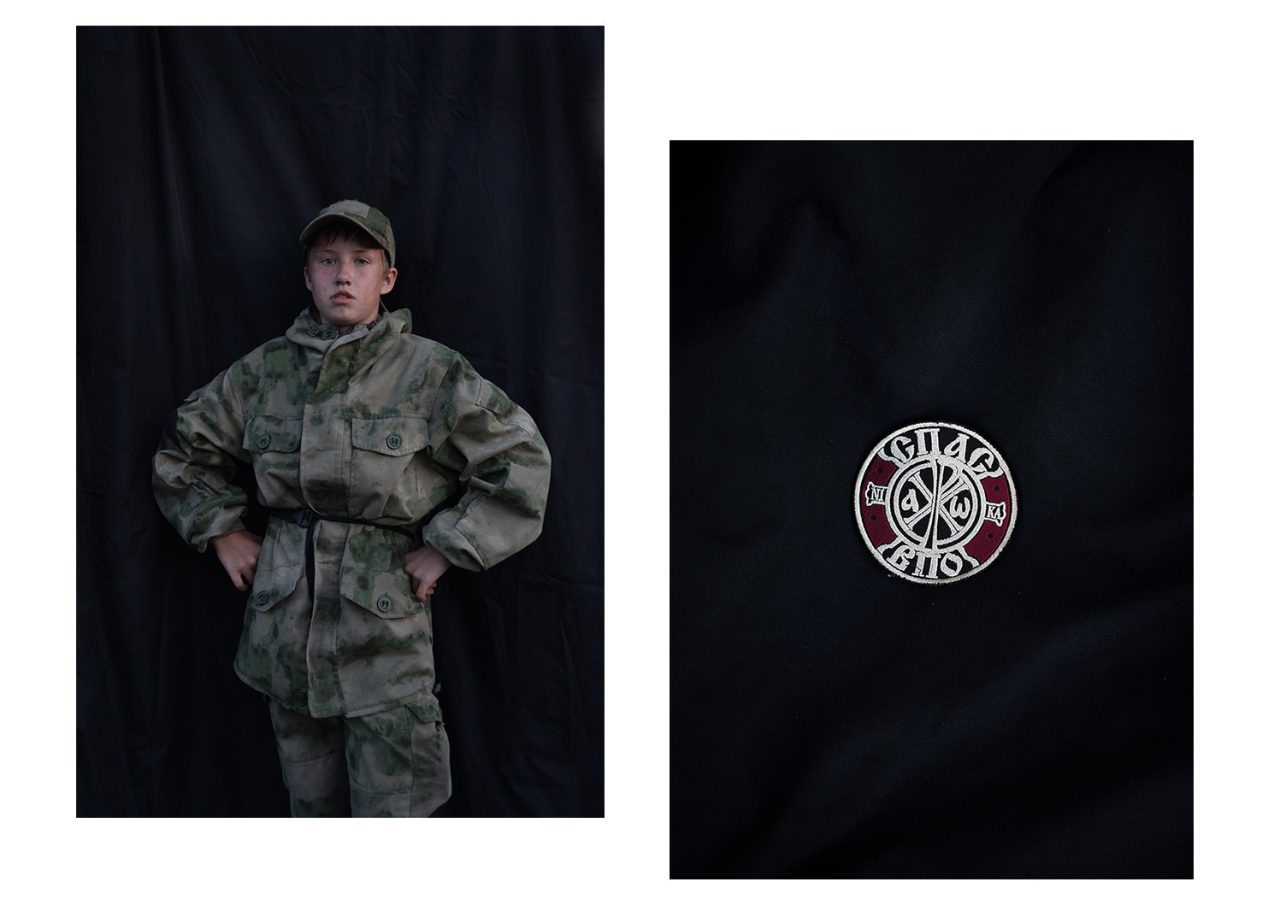
In 2015, to attract boys, the center established a club focused on military skills and patriotism: Spas.
It worked. Boys began signing up. Some of the kids were brought by their parents, St. Matrona’s parishioners; some heard about the classes from friends and asked their parents to enroll them.
The club offered lessons in wrestling and laser tag, as well as discussions of Russian history and Orthodoxy, but according to Denis Neverov, the club’s director, religion is not imposed on the kids, and children from different religious backgrounds participate.
Several times a year, Spas organizes camping retreats that draw participants, including girls, from other cities.
Some retreats are for ages 10 to 13, others for 14 to 18, but participants sometimes stay for both sessions “since it’s boring at home.” Participation is free, but families have to provide their children’s camouflage uniforms and boots.
One of the classes is on combat tactics: teenagers with disabled weapons hone their fighting skills in small groups (teams of two, three, or nine). On command, they stand at attention, drop to one knee, fall on their bellies in tall grass, traverse a field in short fast bursts, take cover behind trees, shoot blanks, evacuate the “wounded,” and defend and storm trenches they have dug themselves.

Many have added chevrons to their uniforms. Some feature the Wagner military group emblem; others proclaim: “We’re Russian, God is with us.” One has a portrait of Putin in dark glasses and the quote: “If a fight is inevitable, you have to strike first.”
As we’re “lying in ambush,” I ask a girl with a multicolored manicure, which contrasts strikingly with the black rifle butt she’s holding, why she’s putting herself through all this. “My dream is to work for the FSB [the Federal Security Service],” she replies. “I think these skills will come in handy.”


One such skill is maneuvering a quadcopter drone. The kids learn to work with topographical maps, determine and communicate coordinates, and conduct reconnaissance. During the exercises they use an army compass designed to measure angles.

The campers form a line to try it out, look through the slit to find their target (the top of a nearby church), then get silly and start targeting one another. They take map work much more seriously: the children try to pin down the exact X/Y coordinates of an “enemy plane.”
“How did you first get involved in military-patriotic education?” I asked Spas director Denis Neverov. He told me that he’d been promoting “patriotism” and working to combat “society’s cultural degradation” since 2011 within another social movement.

In his view: “The people’s spiritual degradation is worse than war. Without Russian people, there won’t be any Russia. In the nineties, the informational field was taken over by Western values. The media was pushing the idea that ‘drunken Vanyas’ hadn’t created anything, that Russia was bad.”

This led Denis to work on children’s patriotic education, and, after he met Father Dionisy, he began teaching classes at Spas. “My father was a colonel in the army. He taught me that Russia is the strongest country and instilled a sense of patriotism in me. I think that in 2000 it was the FSB and Vladimir Putin that held the country together, saved it, and in 2014 nobody expected us to have the resurgence we did.”
He feels certain that for Russians to be victorious, they have to “return to their roots, learn not just to consume but to contribute… How can we think about vacations or expensive purchases when the men at the front are suffering deprivation? Now is not the time to argue who is right, who’s at fault. If our boat sinks now, we’ll go down with it,” Neverov concluded.


The schedule includes a nap after lunch, but the boys don’t want to sleep and start to horse around. They tie one fellow to a chair. He stumbles around the tent looking for something he can use to cut the string. Explosive laughter can be heard from outside. So much for naptime.

One group has been assigned a “penalty task”: a cross-country trek through the woods to a deserted Pioneer camp. They accidentally left their box of “ammo” back at the laser-tag field and they now have to go find it. The boys wander through the abandoned camp, stumble across a medlar berry bush, and begin to chow down, turning their mouths violet.
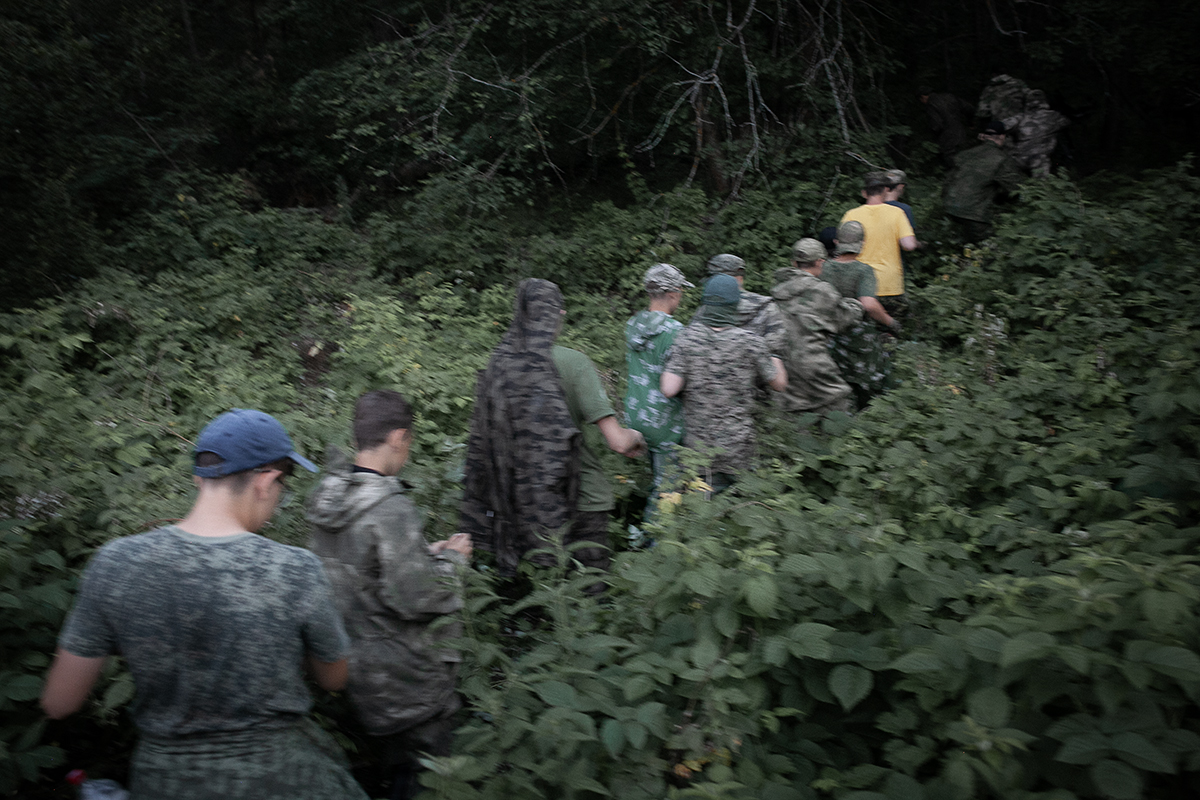
Word comes over the radio that one of the groups has found the box of ammo. They pick it up and run through the rain that has just started falling, singing the refrain of a popular song: “And at dawn a company of soldiers marches on.” The rain intensifies, turning the ground into a slippery, soggy mess.
***
Every day ends with a movie. One evening, the movie is about the current war. A teacher leads a discussion of what they’ve just seen.
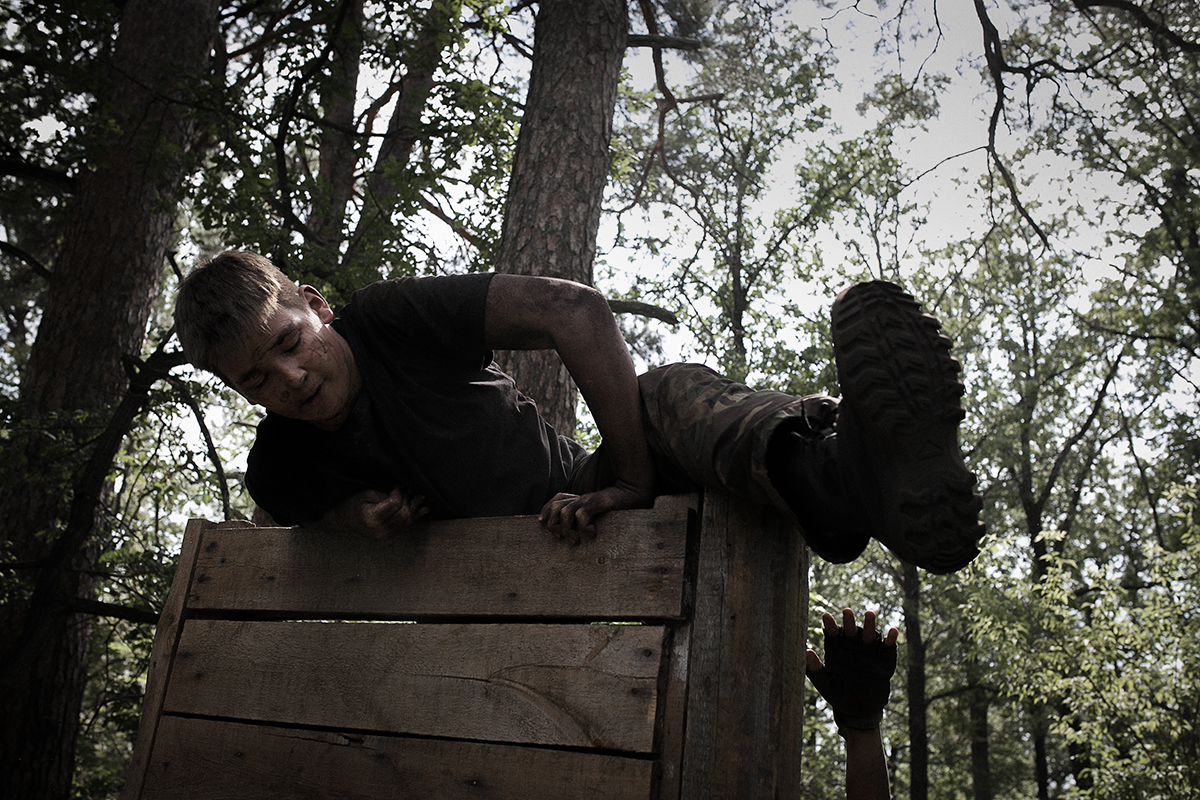
“Men are fighting. On both sides, they have grandfathers who fought fascism, and they speak the same language. And now they have to fight one another. This is the tragedy that has occurred. What do you think? Why has this happened? What is this movie about?” the teacher asks.
“Because in Ukraine, people have come to power who are promoting their personal interests?” is one suggestion.
“Their personal interests or Western interests?” the teacher hints at the “correct” answer.
“Well… Western interests,” the teenager revises his response.
“How do these people differ from us? In terms of worldview? Thirty years went by [since the collapse of the Soviet Union] with no fighting. What happened?” the teacher continues to prod.
“It’s about who gets what land?” another teenager proposes.


“You think we’re short of land? We have more forest, oil, and gas than anyone. Why did this happen? They have told you about this in school,” the teacher continues.
Another teacher asks the kids to imagine: what if a Wagner fighter were to come tomorrow and campers don’t understand what the point of the fighting is.
“So what is going on in their [Ukrainians’] heads now?” the teacher repeats her question.
“That Russians are bad?”
“They’re afraid of us,” one teenager suggests.
“Throughout the autumn of 2021, [the Ukrainians] were concentrating their troops and equipment near the border and wanted to invade,» the teacher says, «and now it’s a nightmare in Belgorod Oblast. The whole world is financing it, supporting it. The equipment is from America. They aren’t particularly afraid of us.” He turns to one of the older campers. “Come on now – help out the patriotic club!”
“I’m still thinking about it,” one boy replies, and everyone falls silent.



“It’s sad,” one of the teachers breaks the silence. “You’re 14, 16, 18, and you’re participating in a patriotic club. It’s just testosterone, to throw knives around, for a sense of freedom, right? Primitive values. Most of the Ukrainian population also lived by these values. Where was the capital of Ancient Rus? In Kiev. Was Vladimir a Russian or Ukrainian prince? Now the capital of the Russian state is in Kiev, which is completely antagonistic toward Russia. It’s an anti-Russian state.”
“So does that mean that the goal of Russia’s policy is to capture the capital of Ancient Rus?” someone asks.
“Not capture: liberate,” the teacher corrects.
“So why haven’t they succeeded?” a teenager asks.
“Does that mean that Russia isn’t the strongest country? Then why are Russians so proud?” another wonders.
“Why shouldn’t they be proud? We have to love our country, even if it doesn’t always succeed. For example, do you love your mother?”
“But that’s completely different!”
“No, it’s not different.”
The children begin to laugh.
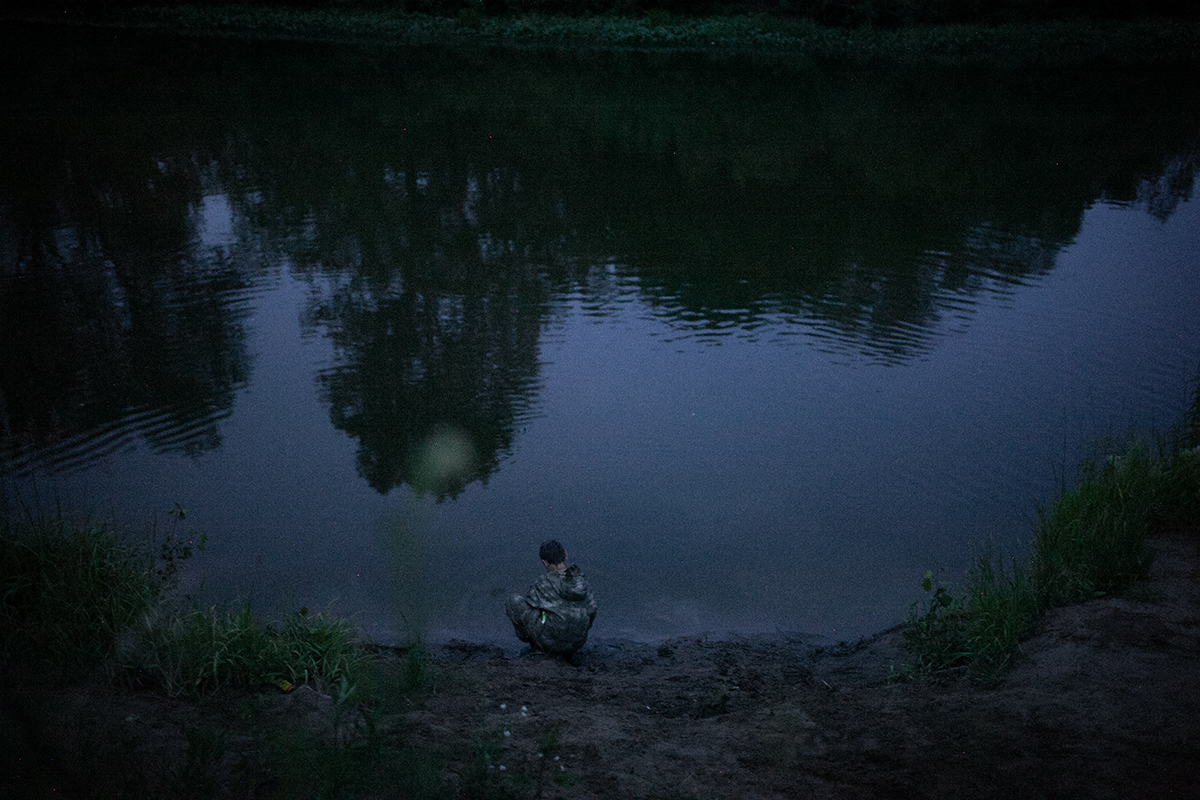
“Now soldiers are fighting and being paid well. And the level of respect for the army is being maintained,” the teacher continues. “Yes, now we are weaker, but sometimes that is good. That way we see what needs to be changed. Life is cyclical, but we only have one motherland. Now you’re sitting here not understanding the point of the Special Military Operation. And that makes us weaker. How many like you are there? How many adults are that way? People were living their lives not worrying about anything. And who you were, what you’re up to, where you came from – nobody cared. That’s the reason for the Special Military Operation. Because most Ukrainians were amorphous, and a small, motivated segment took power. They came up with the idea that they’re some ancient people and Russians aren’t their brothers. They divided and conquered. It’s important to understand this if we don’t want to be divided anymore.”
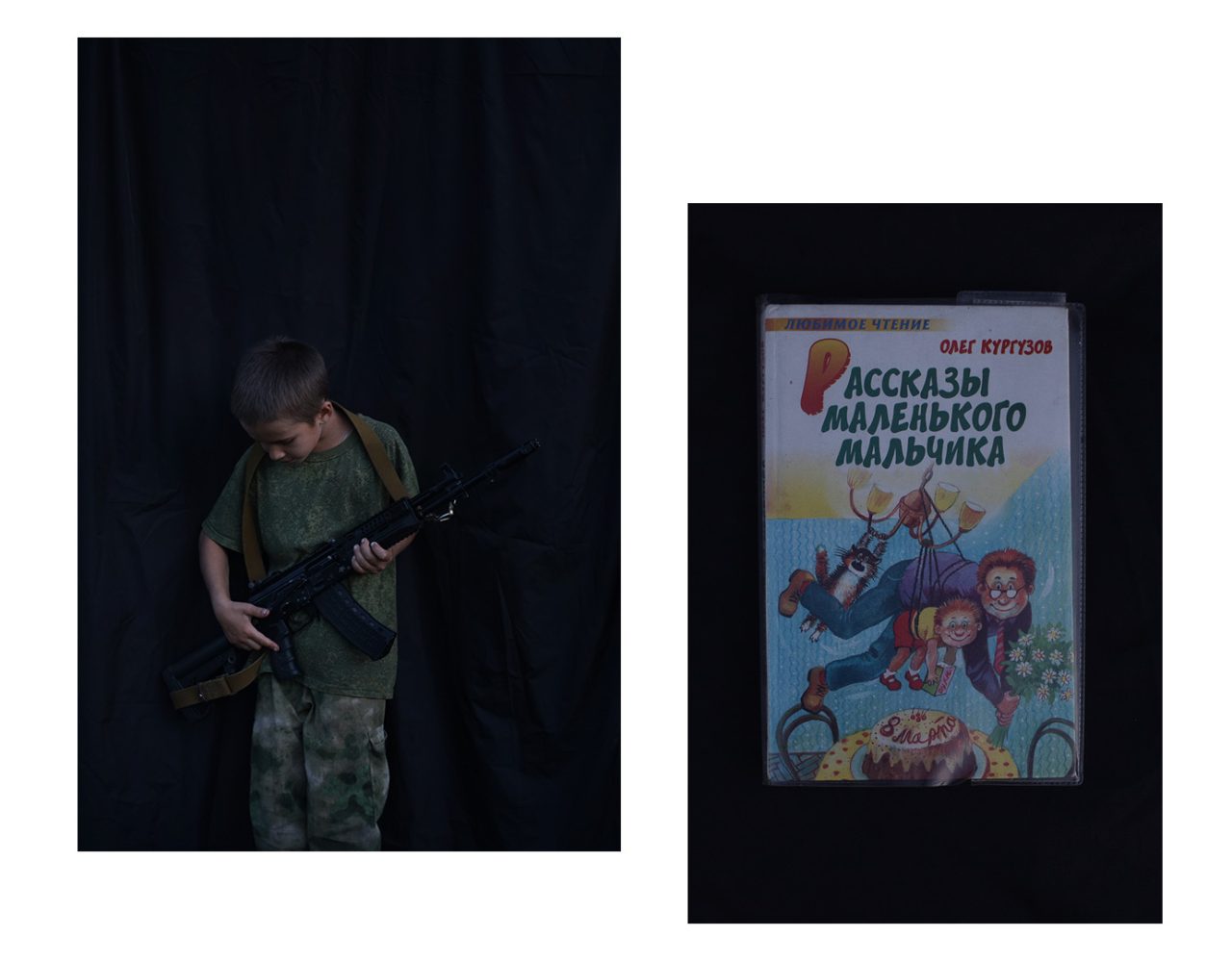
“You say that it’s important to love the motherland and our mothers, that’s good. But war – that’s a political thing?” another teenager ponders.
“This Special Military Operation is not about politics but about worldview. There was a political war at the beginning of the twentieth century, when communism clashed with monarchy. But now in Ukraine people are denying God, destroying churches, and march around with torches and swastikas, speaking the Russian language but garbling it. They are imposing Western values, with 40 genders and same-sex marriages. Here, thank God, we have managed to fend that off,” the teacher replies.


Photo: Daria Aslanian for TD

***
After these discussions, the teenagers go to confession. For many, religion is a familiar part of life: they attend church regularly.
The following morning comes the Sunday service. The entryway is cluttered with camouflage jackets and berets.



The priest delivers the sermon from the altar:
“Today we will hear the Gospel about Jesus’ prayer to God the Father about his disciples. He is praying that they may remain as one. As we go through these days of training, we also urge you to see that unity is the best way to overcome life’s trials and tribulations. They cannot be overcome alone, only with a friend who stands by you, shoulder to shoulder, with whom you can move forward, just like in tactical training. And now we see the breakdown of unity on the planet, where one man takes the life of another. The unity of love is destroyed, and people are uniting over some bad things. But only good can defeat evil.”
This is followed by a reading from the Gospel:
“And Jesus, calling to him a child, he put him in the midst of them and said, ‘Truly, I say to you, unless you turn and become like children, you will never enter the kingdom of heaven… but whoever causes one of these little ones who believe in me to sin, it would be better for him to have a great millstone fastened around his neck and to be drowned in the depth of the sea.”
After this reading of the Gospel, the teenagers receive communion, approaching the chalice by turn, their arms across their chests.
***
A high point for the campers is the overnight hiking excursion. They have to find their way to the campsite on their own. After several hours of wandering through the woods in the heat with heavy backpacks, the kids make a running leap into the river, dragging in anyone reluctant to take the plunge.


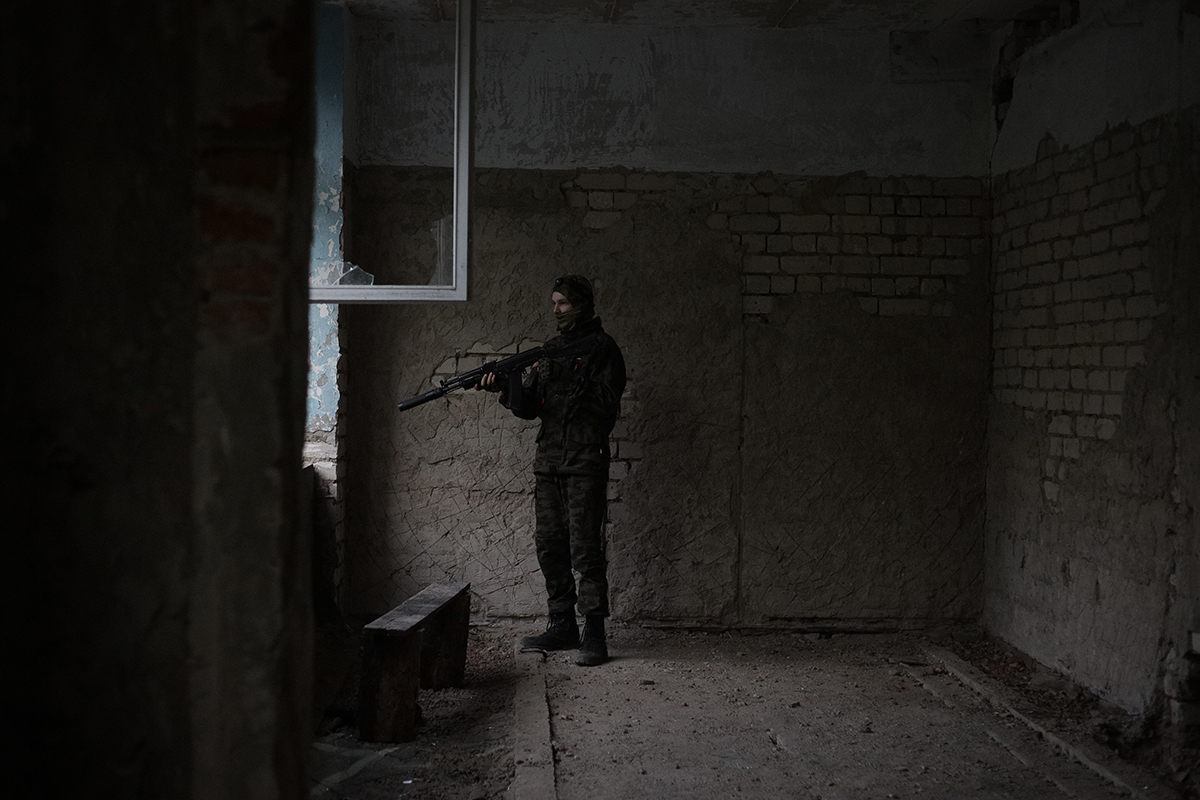

The sultry summer air reverberates with excited shrieks and laughter. The adults set up the tents while the youngsters gather firewood and slap at mosquitoes. After supper cooked over the campfire, everyone sings songs to the accompaniment of a guitar.
I ask the children what they want to do when they grow up. A quiet, reserved girl says that she dreams of being a dog trainer. An older one wants to work as a customs agent. Several of the kids want to join the military. A boy in glasses wants to be a psychologist, while another involved in team sports wants to be a sports journalist. He’s not planning to join the military but says he’ll serve if he’s called up.
“We’re all in favor of that, of being ready for war,” he says.
“War is always a consequence of a lack of mutual understanding,” a teenager with a long forelock says.
“When it’s the motherland at stake, you don’t worry about understanding,” the future sports journalist counters.

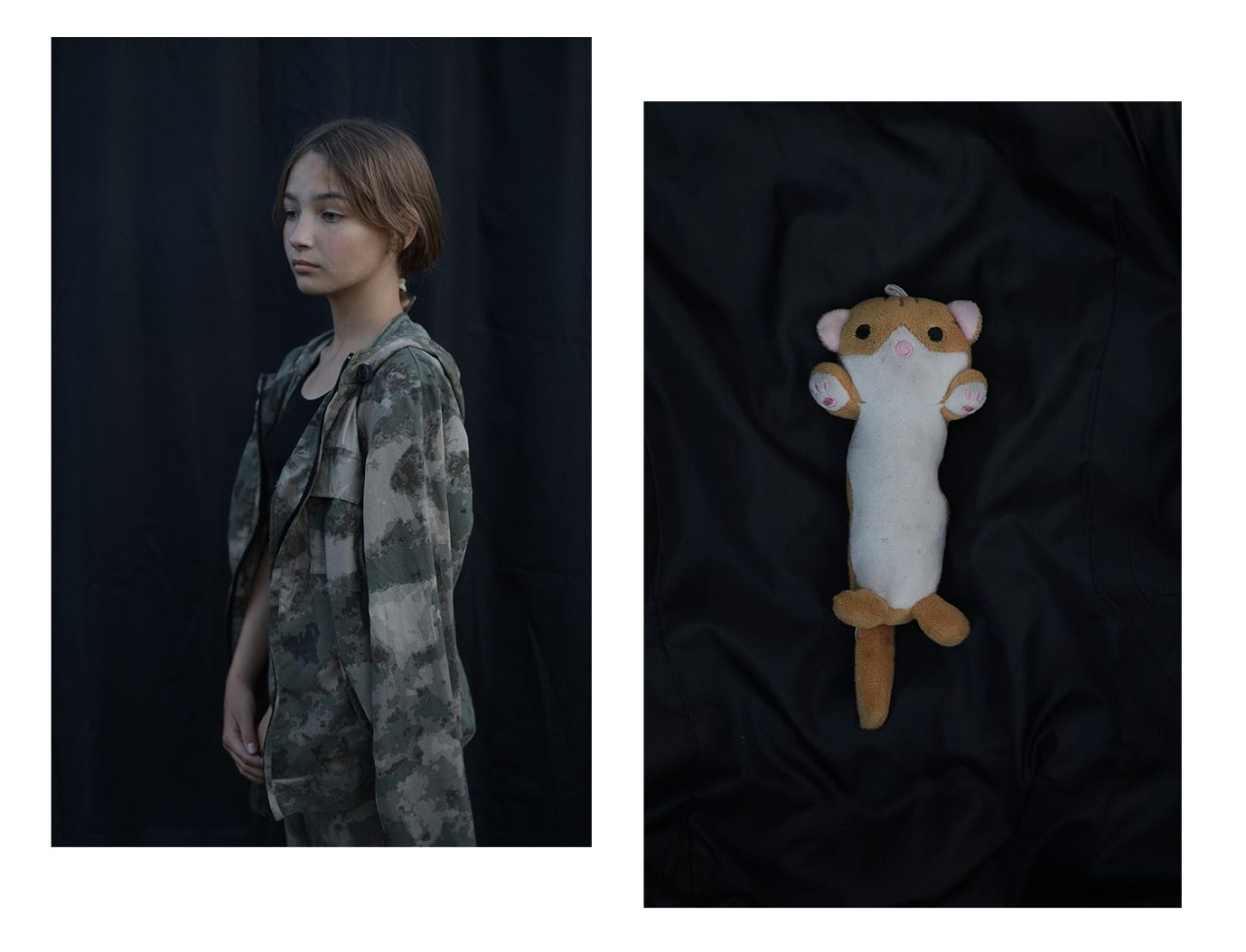
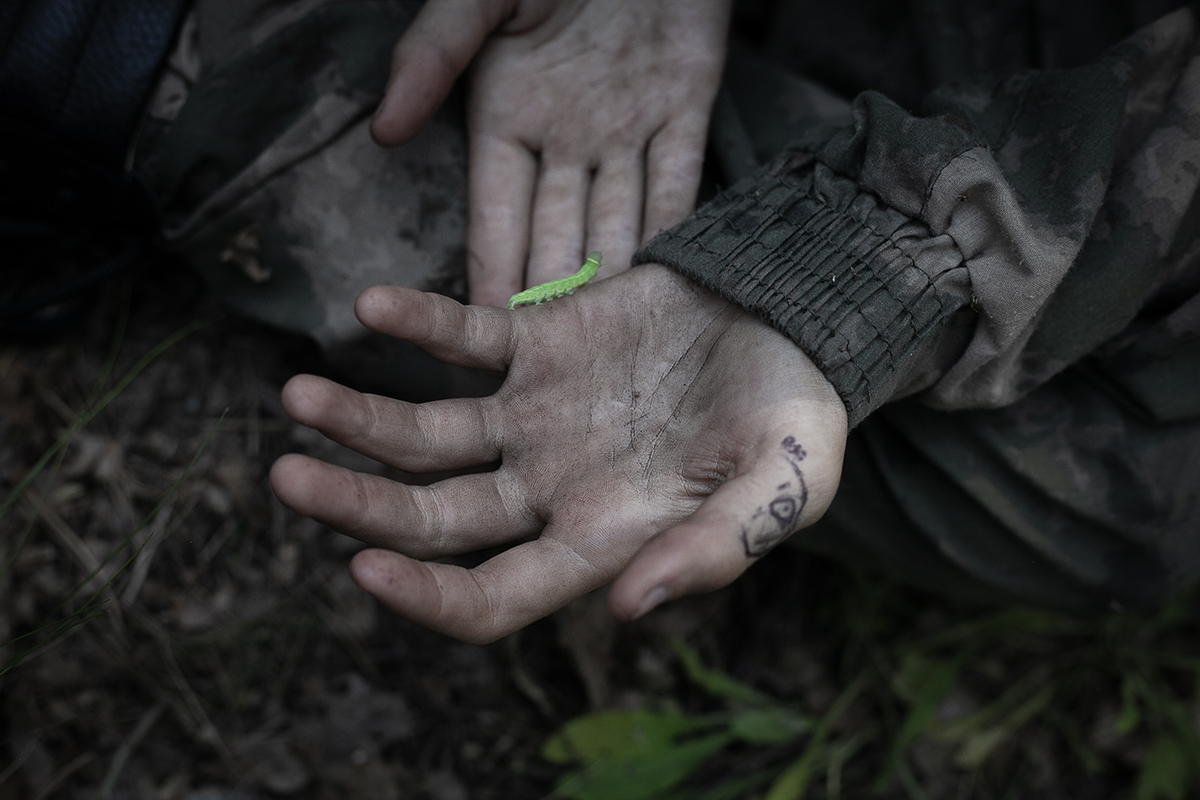
The camp experience ends with a series of tests: a cross-country race, a skills test, and an obstacle course. Campers have been taught to develop esprit de corps: your own finish time is less important than your team’s overall result.
The obstacle course has the kids jumping over a wall, crawling through a tunnel of tires, and slithering through a maze on their bellies. Those who have trouble are hoisted and tugged along by their comrades. For some, the challenges are overwhelming, and they burst into tears that form rivulets down their dusty cheeks.





Next comes the timed task of disassembling and reassembling an assault rifle and loading the magazine with “cartridges,” followed by target practice – both knife throwing and target shooting with an air rifle. As they await their turn, the kids horse around and laugh. One girl sits off to the side and watches a green caterpillar crawl across her hands.
Finally comes the graduation ceremony. Campers are given diplomas and chevrons, and top performers get black berets. As they receive their awards, the teenagers salute and declare: “I serve the fatherland and the Orthodox faith!”
***
Before leaving, this correspondent asks a group of boys: “What if there were no wars and you didn’t need to prepare for them. In that case, how would patriotism be expressed?”
The boys fall silent and pensive.
“That’s different for different people,” one responds.
“Being a volunteer – that’s also helping the motherland,” another says.
“Going to rural areas to dig a well,” a third chimes in.
“Or setting up a store. Here, for example, there’s no store. People have to travel to the neighboring village. It’s inconvenient.”




Каждый день мы пишем о самых важных проблемах в нашей стране. Мы уверены, что их можно преодолеть, только рассказывая о том, что происходит на самом деле. Поэтому мы посылаем корреспондентов в командировки, публикуем репортажи и интервью, фотоистории и экспертные мнения. Мы собираем деньги для множества фондов — и не берем из них никакого процента на свою работу.
Но сами «Такие дела» существуют благодаря пожертвованиям. И мы просим вас оформить ежемесячное пожертвование в поддержку проекта. Любая помощь, особенно если она регулярная, помогает нам работать. Пятьдесят, сто, пятьсот рублей — это наша возможность планировать работу.
Пожалуйста, подпишитесь на любое пожертвование в нашу пользу. Спасибо.
Помочь нам